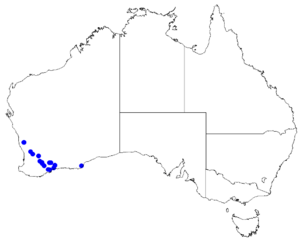Boronia penicillata facts for kids
Quick facts for kids Boronia penicillata |
|
|---|---|
| Scientific classification | |
 |
|
| Occurrence data from Australasian Virtual Herbarium |
Boronia penicillata is a special plant that belongs to the citrus family, called Rutaceae. It is found only in the south-west part of Western Australia, which means it is endemic there. This plant is a low, spreading shrub with leaves that look a bit like feathers (called pinnate leaves). Its pretty white flowers have four petals and eight parts that produce pollen, called stamens.
Contents
What Does Boronia penicillata Look Like?
Boronia penicillata is a shrub that spreads out and usually grows up to about 30 centimeters (about 12 inches) tall. Its leaves are attached directly to the stem without a stalk (this is called sessile). Each leaf is made up of three or five smaller parts, called leaflets. These leaflets are thin and shaped like a narrow wedge, usually about 5 to 12 millimeters (0.2 to 0.5 inches) long.
The flowers grow one by one where the leaves meet the stem (this spot is called an axil). Each flower sits on a tiny stalk, or pedicel, which is only 1 to 2 millimeters long. The flower has four green leaf-like parts called sepals, which are egg-shaped and about 1.5 to 2 millimeters long. The four white petals are the showy parts, and they are about 2 to 3.5 millimeters long. Inside the flower, there are eight stamens, which are slightly hairy. The very tip of the pollen-producing part of the stamen (the anther) has a tiny point. You can usually see these plants flowering mostly from October to November.
How Did It Get Its Name?
The plant Boronia penicillata was first officially described in 1863 by a scientist named George Bentham. He studied a plant sample collected by another botanist, James Drummond. The description was then published in a book called Flora Australiensis.
The second part of its name, penicillata, comes from a Latin word, penicillum. This word means "little tail," "painter's brush," or "tuft." It probably describes how some part of the plant looks, perhaps the way the leaflets are arranged or the stamens.
Where Does Boronia penicillata Grow?
This type of boronia plant likes to grow in sandy soil. It has a disjunct distribution, which means its populations are found in separate areas, not all connected. You can find it growing in places between Toodyay and the Fitzgerald River in Western Australia.
Is It Protected?
The Western Australian Government's Department of Parks and Wildlife has looked at Boronia penicillata. They have classified it as "not threatened," which means it is not currently at risk of disappearing.

